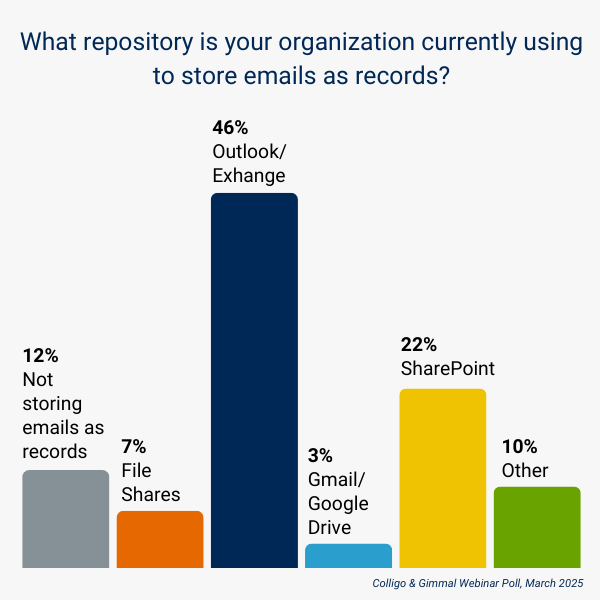Last Updated on March 31, 2025 Jenn Smith
Monthly Industry Trends & Insights From Colligo CEO Tim Brady
While email (and Outlook) serves as the predominant standard for business communication, it is meant to be a communication channel, not a storage location for information. Outlook storage is limited and not designed to be a secure, compliant email record keeping system.
Yet a surprising number of organizations we speak to are still utilizing Outlook as a repository (prior to working with us at Colligo). This means organizations are not compliant for a couple of reasons:
- End-users can delete business records, and
- By not centralizing records in the designated repository, records cannot be accessed by those who need them most, destroying their value to the organization and as records.
We ran a poll in a recent webinar that highlighted the level of non-compliance among businesses. 46% of attendees responded that they are currently using Outlook/Exchange to store emails as records. (Perhaps the only more alarming number was the fact that 12% of attendees’ organizations are not saving emails as records!)

We believe that ‘in-place’ records management has many drawbacks. (Note, by ‘in-place,’ we mean that records are left in the location where they are created or captured, rather than being moved to a centralized repository or system of record, such as SharePoint.) Some of the obvious negatives of in-place records management include:
- Assumes Incomplete Record Management
- Non-Compliant Retention Labels
- Reliance on Dynamic System Data
- Limited Metadata Capabilities
Thus, organizations should store all records, not just email records, in SharePoint. For more details on this, refer to our blog Why In-Place Records Management is Not Compliant.

Lastly, as we look at information and data governance, and newer uses for emails and email data, this data is best kept in a central repository. There, the data can be enriched with metadata (labels or tags), so it is structured, findable and usable again in the future and can provide your organization with insights. What good is valuable data to your organization if it is trapped in workers’ siloed inboxes?
We have written on this topic quite extensively. For more information, see Email Retention: A Key Aspect of Information Management. Or, if you’d like to discuss this topic and hear more best practices, please get in touch with our team.
Disclaimer: The opinions expressed here are solely my own and do not necessarily reflect the views of Colligo. Think of them as ‘strong opinions, loosely held.’ Proceed with curiosity and a sense of humor!


